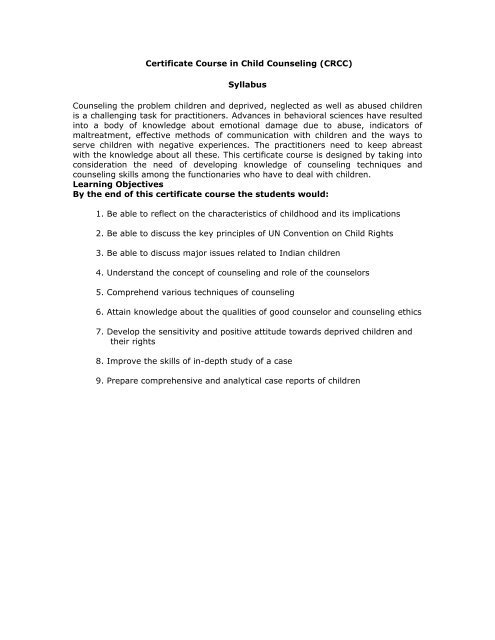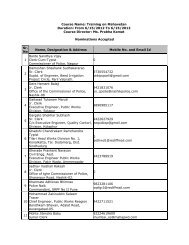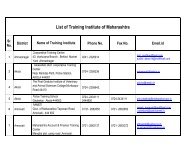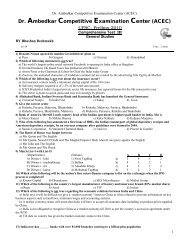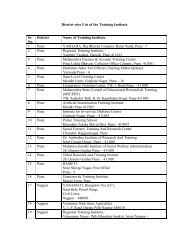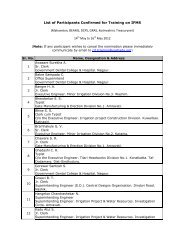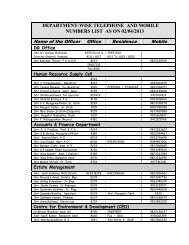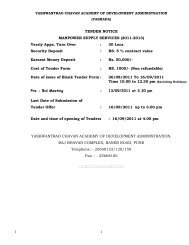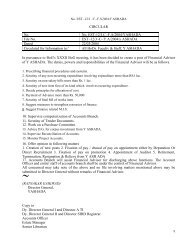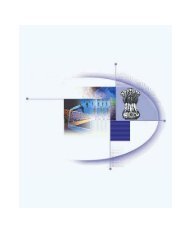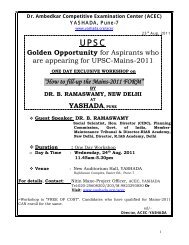Certificate Course in Child Counseling (CRCC) Syllabus ... - yashada
Certificate Course in Child Counseling (CRCC) Syllabus ... - yashada
Certificate Course in Child Counseling (CRCC) Syllabus ... - yashada
You also want an ePaper? Increase the reach of your titles
YUMPU automatically turns print PDFs into web optimized ePapers that Google loves.
<strong>Certificate</strong> <strong>Course</strong> <strong>in</strong> <strong>Child</strong> Counsel<strong>in</strong>g (<strong>CRCC</strong>)<strong>Syllabus</strong>Counsel<strong>in</strong>g the problem children and deprived, neglected as well as abused childrenis a challeng<strong>in</strong>g task for practitioners. Advances <strong>in</strong> behavioral sciences have resulted<strong>in</strong>to a body of knowledge about emotional damage due to abuse, <strong>in</strong>dicators ofmaltreatment, effective methods of communication with children and the ways toserve children with negative experiences. The practitioners need to keep abreastwith the knowledge about all these. This certificate course is designed by tak<strong>in</strong>g <strong>in</strong>toconsideration the need of develop<strong>in</strong>g knowledge of counsel<strong>in</strong>g techniques andcounsel<strong>in</strong>g skills among the functionaries who have to deal with children.Learn<strong>in</strong>g ObjectivesBy the end of this certificate course the students would:1. Be able to reflect on the characteristics of childhood and its implications2. Be able to discuss the key pr<strong>in</strong>ciples of UN Convention on <strong>Child</strong> Rights3. Be able to discuss major issues related to Indian children4. Understand the concept of counsel<strong>in</strong>g and role of the counselors5. Comprehend various techniques of counsel<strong>in</strong>g6. Atta<strong>in</strong> knowledge about the qualities of good counselor and counsel<strong>in</strong>g ethics7. Develop the sensitivity and positive attitude towards deprived children andtheir rights8. Improve the skills of <strong>in</strong>-depth study of a case9. Prepare comprehensive and analytical case reports of children
ContentModule 1: <strong>Child</strong> Development• Stages and Characteristics of <strong>Child</strong> DevelopmentModule 2: The Basics of Counsel<strong>in</strong>g• Counsel<strong>in</strong>g: concept• Types of counsel<strong>in</strong>g• Core conditions for counsel<strong>in</strong>g relationship• Personality and background of counselor• Ethical aspects of counsel<strong>in</strong>gModule 3: Counsel<strong>in</strong>g different types of children (For DWCD functionaries)• <strong>Child</strong> <strong>in</strong> need of care and protection: mean<strong>in</strong>g• <strong>Child</strong>ren <strong>in</strong> conflict with law: mean<strong>in</strong>g• Abused children• Counsel<strong>in</strong>g needs of above childrenModule 3: Counsel<strong>in</strong>g <strong>in</strong> Education (For Education functionaries)• Counsel<strong>in</strong>g needs <strong>in</strong> educational sett<strong>in</strong>g• <strong>Child</strong>ren with special needs: Types and characteristics• Counsel<strong>in</strong>g areas at different levels of educationModule 4: <strong>Child</strong>ren's problems and their IdentificationA) Identify<strong>in</strong>g children's follow<strong>in</strong>g problems• Behavioral Problems• Personality Disorders• Problems such as depression, low self esteem, anxiety etc• Addiction• Defense mechanisms used by children• Any other problems that are prevalent among children
B) Overview of data gather<strong>in</strong>g tools and techniques and their usesModule 5: Counsel<strong>in</strong>g strategies and skillsA) Strategies that build rapport and client dialogue• Attend<strong>in</strong>g and encourag<strong>in</strong>g• Restat<strong>in</strong>g• Paraphras<strong>in</strong>g• Reflect<strong>in</strong>g• Perception check<strong>in</strong>g• Summariz<strong>in</strong>gB) Strategies that aid <strong>in</strong> data gather<strong>in</strong>g• Question<strong>in</strong>g• Prob<strong>in</strong>gC) Strategies that add depth and enhance relationship• Self disclosure• Confrontation• Respond<strong>in</strong>g to non-verbal Behaviour• DocumentationModule 6: Interview<strong>in</strong>g skillsA) Counsel<strong>in</strong>g <strong>in</strong>terviews: Concept and mean<strong>in</strong>g• Purpose of counsel<strong>in</strong>g <strong>in</strong>terviews• Interview<strong>in</strong>g Behaviour: Verbal and Non-verbal• Interview<strong>in</strong>g process• Pr<strong>in</strong>ciples for effective <strong>in</strong>terviewB) Group counsel<strong>in</strong>g (Concept, need and process)
Module 7: Theories of counsel<strong>in</strong>g• Adlerian Theory• Cognitive Behaviour Therapy• Reality Theory• Rational Emotive Behavior Therapy• Carl Rogers Client Centered Therapy• Humanistic theories• Psychoanalytic TheoryModule 8: Apply<strong>in</strong>g theory <strong>in</strong>to practice (Practical)• Identify<strong>in</strong>g problem child and the problem of the child• Case study of a problem child• Interview<strong>in</strong>g a child• Counsel<strong>in</strong>g session of 30 m<strong>in</strong>utes for a child (Role Play)


